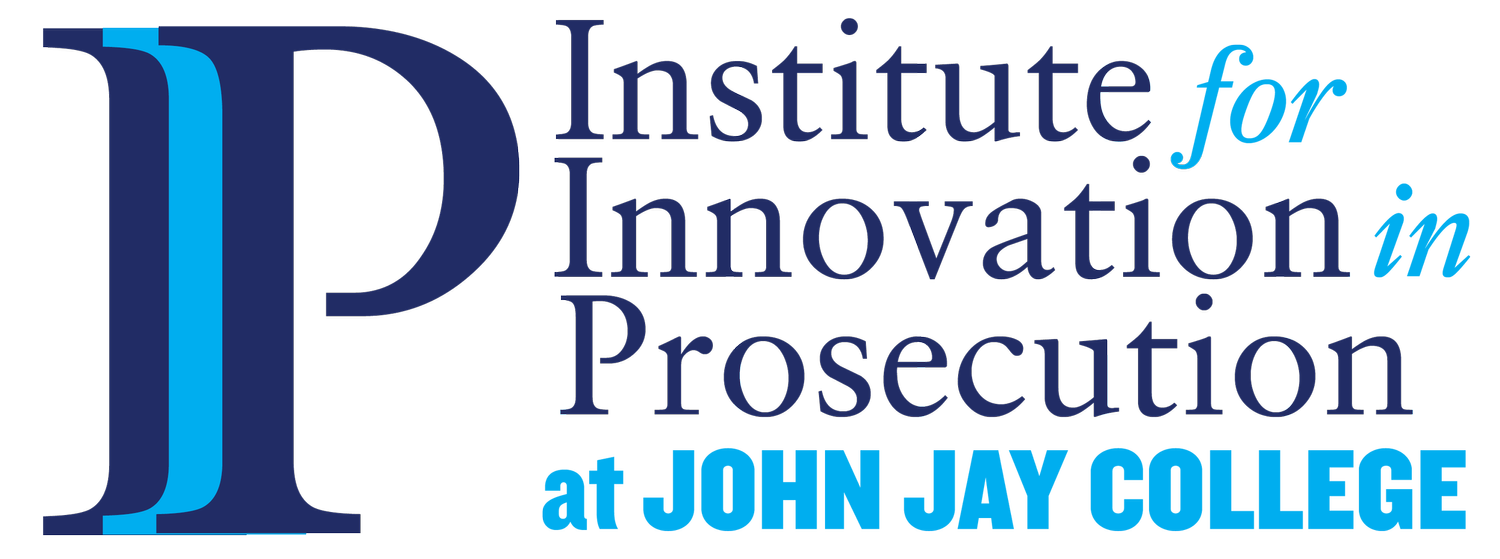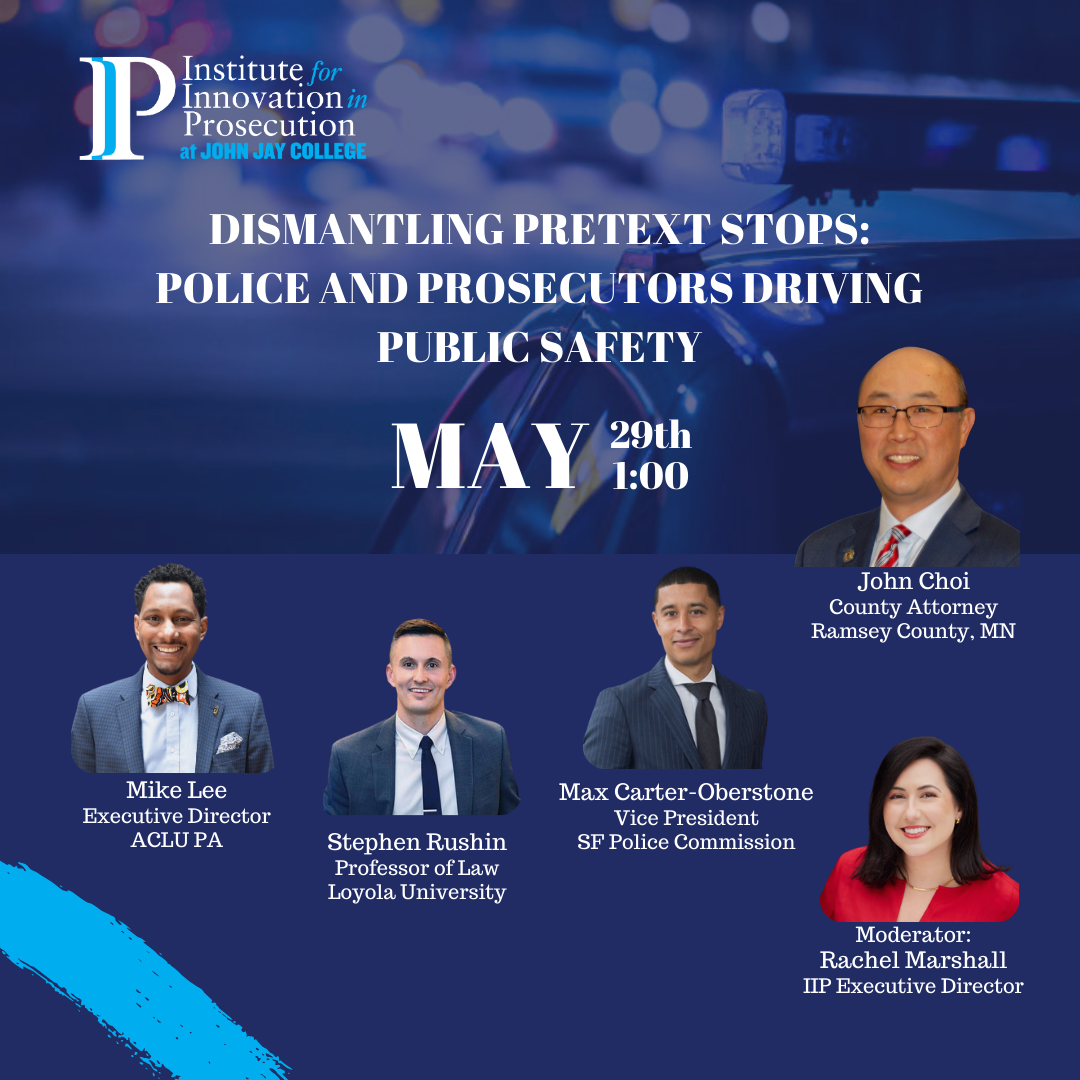Dismantling Pretext Stops:
Police and Prosecutors Driving Public Safety
Wednesday, May 29, 2024 • 1:00pm ET
Our May webinar discusses how police and prosecutors can end pretextual traffic stops. Joining our conversation are:
John Choi, Ramsey County Attorney (MN);
Mike Lee, Executive Director, ACLU of Pennsylvania;
Max Carter-Oberstone, Vice President, San Francisco Police Commission;
Stephen Rushin, Associate Dean of Academic Affairs and Judge Hubert Louis Will Professor of Law, Loyola University Chicago School of Law; and
Moderator: Rachel Marshall, Executive Director, Institute for Innovation in Prosecution
Pretext stops have long contributed to racial disparities in policing and punishment. Data shows that traffic enforcement laws result in a disproportionate number of Black drivers being stopped for non-safety violations, and an even greater disparity in the number of Black and Latino drivers being detained and searched. Recently, some law enforcement agencies and prosecutors’ offices have enacted policies aimed at reducing or even eliminating pretextual stops–without detriment to public safety.
Our conversation features national leaders on this issue, including Ramsey County Attorney (MN) John Choi, whose office has conducted an ongoing collaboration with community stakeholders to reduce non-public safety traffic stops. Learn more about how prosecutors, police, and community stakeholders can work together to improve public safety, reduce racial disparities in policing, and foster trust through this important work.
John Choi
Ramsey County, MN County Attorney
John Choi was sworn in as the first Korean American chief prosecutor in the country in 2011. Since taking office, John has become a state and national leader in progressive reform, working with public officials and impacted communities to reimagine justice and the role of prosecutors. John’s innovative approach to working collaboratively with system and community partners has transformed the way government responds to domestic violence, sex trafficking and sexual assaults in Minnesota, and has improved support for victim/survivors. In addition, John has been a champion of raising boys and engaging men to prevent violence against women and girls; successfully advanced legislation to reunite families when it’s in foster children’s best interest; advocated to reform state drug laws and reinvest savings in community-based solutions; established a Veterans Court; expanded prosecutors’ role in assuring justice by mitigating collateral consequences, facilitating sealing the records of those who have successfully rehabilitated, reviewing past convictions and sentences to ensure integrity, and better responding to youth referred to the legal system by engaging impacted communities in collaboratively reviewing cases and restoratively responding to address underlying needs and repair harm caused to victims and community. John serves on the boards of Institute for Innovation in Prosecution, Mitchell Hamline School of Law, Veterans Defense Project, Law Enforcement Leaders to Reduce Crime and Incarceration, Association of Prosecuting Attorneys, Karpel Foundation, the National Policing Institute, and A Call To Men. He was formerly president of the Minnesota County Attorneys Association, trustee for the Women’s Foundation of Minnesota, and board member of the Minnesota Coalition Against Sexual Assault.
John received the 2015 Minnesota County Attorneys Association Award of Excellence for his innovative leadership to combat sex trafficking; the 2019 Profiles in Courage Award from the Minnesota Association of Black Lawyers for his efforts to improve prosecutor responses to officer-involved fatalities in Minnesota, and the 2023 Professional Impact Award from End Violence Against Women International (EVAWI) for his work to improve community and systems’ response and outcomes for victim/survivors of sexual assault. Previously, John served as Saint Paul City Attorney (2006-2010) and spent a decade in private practice. John holds a bachelor’s degree in Psychology from Marquette University, a J.D. from Hamline University School of Law, and was a Humphrey Policy Fellow at the University of Minnesota.
Mike Lee
Executive Director, ACLU Pennsylvania
Mike Lee joined the ACLU of Pennsylvania as executive director in 2024. A born and raised Philadelphian, Mike served for six years in the administration of Philadelphia District Attorney Larry Krasner, as director of government affairs, supervisor of adult diversion, and chief of staff. Mike founded and served as executive director of Philadelphia Lawyers for Social Equity, a nonprofit legal aid firm that helps Pennsylvanians expunge their criminal records, a program that would later become a model for Pennsylvania's Clean Slate law. In his early years practicing law, he specialized in criminal defense and had a number of clients who had been prosecuted during the Occupy protests. Mike was also a regular legal observer, including during the G20 protests in Pittsburgh in 2009.
Mike is a graduate of George Washington University with a degree in communications and was part of the inaugural class at the Drexel University Thomas R. Kline School of Law in 2006, where he co-founded an ACLU chapter. (Philadelphia)
Max Carter-Oberstone
Vice President, San Francisco Police Commission
Max is the Vice-President of the San Francisco Police Commission, and an attorney specializing in appellate litigation. He has litigated matters across a wide range of subject areas, both criminal and civil, with a particular emphasis on constitutional litigation and statutory interpretation. He was an attorney in the Supreme Court & Appellate Group of a large international law firm, and before that, an Associate Deputy Solicitor General at the California Department of Justice. In 2021, Max was an Orrick Justice Fellow at the Policing Project at NYU Law School—a non-profit think tank focused on police reform and democratic accountability. There, he drafted model legislation on a range of policing-related topics. He also designed and implemented the Policing Project's Fourth Amendment impact litigation strategies.
Max graduated from Georgetown University with a double major in Finance and French, and holds a J.D. from Stanford Law School.
Stephen Rushin
Judge Hubert Louis Will Professor of Law, Loyola University Chicago School of Law
Professor Rushin teaches Criminal Law, Evidence, and Police Accountability. His research interests include policing, criminal procedure, and criminal sentencing. His work has recently appeared in the Stanford Law Review, the University of Pennsylvania Law Review, the California Law Review, the Cornell Law Review, the Duke Law Journal, the Vanderbilt Law Review, the Texas Law Review, the Iowa Law Review, the Minnesota Law Review, the George Washington Law Review, the Fordham Law Review, the Boston College Law Review, and the Florida Law Review, among other journals. Cambridge University Press published his book, “Federal Intervention in American Police Departments,” in 2017.
He has served in a variety of advisory roles related to his expertise in criminal justice policy and social science, including a previous gubernatorial appointment as the academic advisor to the Illinois Racial Profiling Prevention and Data Oversight Board between 2020 and 2022.
Professor Rushin has won multiple teaching awards, including “Professor of the Year” in 2020. As Associate Dean of Academic Affairs, he manages law school curriculum and develops academic policies. Before joining Loyola in 2017, he taught at the University of Alabama School of Law and the University of Illinois College of Law.
Rachel Marshall
Executive Director, Institute for Innovation in Prosecution (moderator)
Rachel Marshall is the Executive Director of the Institute for Innovation in Prosecution.
Rachel previously served as the Director of Communications and Policy Advisor at the San Francisco District Attorney’s Office, following nearly a decade working as a public defender in Alameda County, California. Rachel has extensive expertise in the criminal legal system and efforts to reform it, as well as experience in media, policy, and advocacy.
Rachel graduated from Stanford Law School and Brown University. After law school, she clerked for federal District Court Judge David O. Carter in the Central District of California. Prior to law school, she taught high school history for three years in the Bronx.






